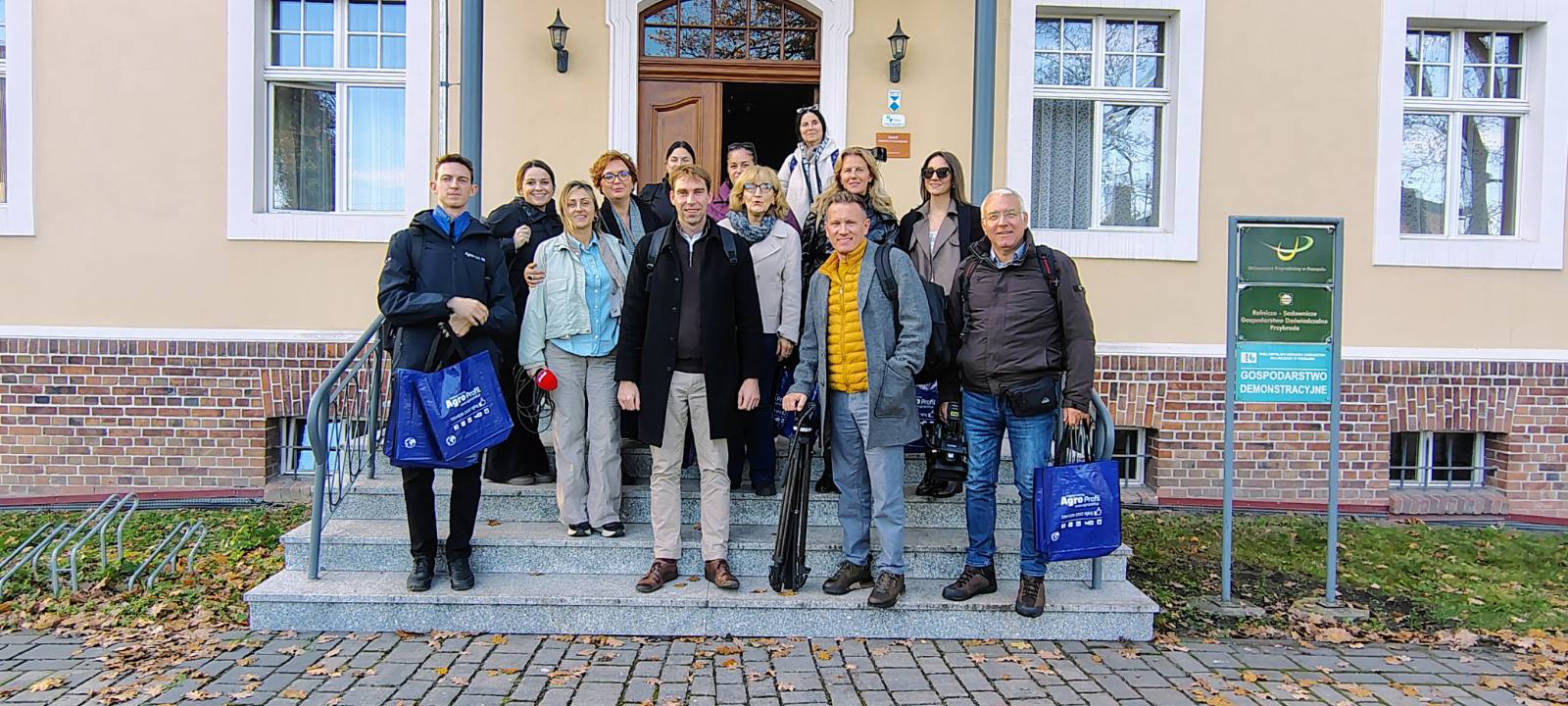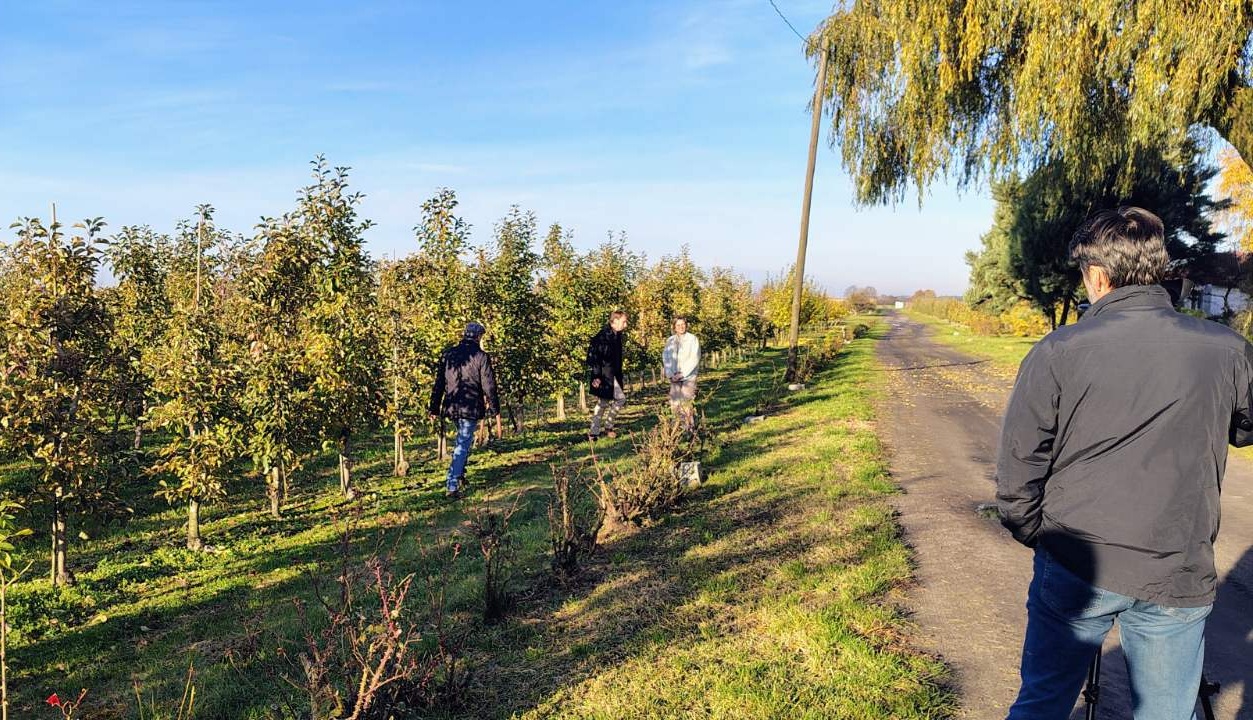Serbian journalists in visit to Poland: its agriculture is a true success story
“Agriculture in Poland – European success story”: this was the title of the programme of a visit of a group of Serbian journalists to Poland, this fall. From 2 to 6 November, journalists of mainstream Serbian media have visited the country in order to explore how Poland successfully upgraded the agriculture and food sector after joining the EU.
This was a unique experience for 11 Serbian journalists from national electronic, print and online media. They were prepared for an intensive programme, but the five following days enabled them more - to vividly trace the path of Poland’s remarkable agricultural evolution since joining the European Union. Through policy meetings, farm visits, and conversations with university and academia experts, they had a picture with clarity: EU membership has reshaped Polish agriculture into one of Europe’s most dynamic sectors - precisely because Poland learned how to use EU funds with vision and long-term planning.
The visit was organised by the Pulse of Europe - Media Trips to EU project, in close cooperation with the Embassy of Poland in Belgrade. The core idea was to showcase to journalists, but also to present, via their media reports, the experience of Poland to the Serbian public and decision makers. More so when taken in consideration that the agriculture is one of important sectors in Serbia, recognised by the Serbian government as a strategic economic sector. In that sense, exploring how Poland as an EU member state reached the level of ten-fold export of its agriculture and food products compared to its pre-EU status was a good idea.

The programme included meetings with relevant state institutions and experts as well tours of agricultural farms. The kick-off was in the Ministry of Agriculture and Rural Development, where journalists were briefed by the Deputy Minister, Mr. Jacek Czerniak. He outlined the basic data as well as the goals of the Common Agricultural Policy. “We are trying to use EU funds by 100 percent. Earlier, funds were used mostly for machinery; today, we support agriculture 4.0, i.e. innovations in the sector,” Mr. Czerniak said. How does it look on the field, the group had a glimpse on in Magnuszew, during a visit to the agricultural company Gruppa Organic.
Its CEO, Mr. Damian Kozlowski walked the group through the firm’s storage premises, explaining how EU-funded investments helped the company introduce modern storage techniques. The data are clear: the company produces some 25,000 tons of organic apples annually. And the apples were of the exquisite taste.
At the National Support Centre for Agriculture, the group learned how this relatively young institution of 8 years successfully has integrated its tasks - managing state-owned agricultural property, supporting the development of rural areas, and implementing agricultural and food market policies. They well noted an umbrella message of the Agency campaign: “Poland tastes good”, as well as the Agency’s efforts in improving public health by introducing novelties in school meal routines: healthier domestic food and reducing food leftoversLater, at the Institute of Agricultural and Food Economics, its researchers discussed with journalists economic trends, sustainability challenges, and the introduction of a new system, FSDN ( in Poland. For visiting journalists from Serbia - where agriculture accounts for an important share of the national economy - these insights provided valuable context for comparisons.
The common thread was already clear: Poland’s progress is very much based on an institutional reform made not only at the beginning of its EU path, but also during it.
The field trip to Poznan took the group out of the capital and into the heart of Polish agricultural innovation. Its start was at the Poznan University of Life Sciences (PULS), where the highlight was the Drone Laboratory - a space where students and researchers are using aerial technology to monitor crop conditions, optimize fertilization, and perfect precision agriculture techniques.
From there, the journey continued to the University’s experimental farm in Przybroda, under a close eye of the amazing host and guide, Mr. Stanislaw Switek from the Faculty of Agriculture, Horticulture and Biotechnology. Mr. Switek is certainly not the only one from the PULS University to whom Serbian journalists owe a great gratitude for the hospitality and readiness to devote their time; this goes to all, from Ms. Karolina Pawlak, Vice-Rector for International Relations and Mr. Tomasz Garbowski, Vice-Dean for Research to all of their associates.

Tour of Przybroda farm was short in time for all the interests of Serbian journalists, majority of were specialized in covering agriculture. Milk production, apple production, photovoltaic farm… these were all filmed by the journalists. They have interviewed the director of the Farm, Mr. Filip Mazur but also Amalia, one of the students volunteering at it.
In the nearby farm of Mr. Jakub Napierała, the group encountered yet another perspective: that of the individual Polish farmer who has achieved success in its business, but today faces, as he put it “troubles in making business” because of administrative burdens and demands related to the green development and sustainability.
Already understanding that one of the keys of Polish success in agri-food sector are the efficient institutions, journalists picked up another proof back in Warsaw on the last day of their trip, during the visit to the Agency for Restructuring and Modernisation of Agriculture. There they collected missing parts of the puzzle – the latest data about the functioning of the Agency, about allocated and distributed subventions, as well as other data about the use of EU funds. “From 2004 to 2024, a sum of 56,1 billion of EUR was paid in direct payments in the agricultural sector,” Mr. Tomasz Wazbinski, deputy director revealed to journalists.
The closure of the programme was a special one: the meeting with former chief negotiator of Poland’s EU accession treaty, Mr. Jan Truszczyński. He offered a broader historical lens, speaking about the strategic choices Poland made during accession, the challenges it faced, and the long-term benefits that emerged for the country. His message was clear: each year after the accession to the EU, 3,6 % is annual growth in the country; overall volume of Polish agriculture growth is 10-fold. “It was definitely worth the effort (joining the EU),” Mr. Truszczyński concluded the meeting held in the EC Representation to Poland.
This was a fitting conclusion: agriculture was not merely adjusted to EU standards - it became a symbol of Poland’s successful integration into the European project.
What participants said - Marija Miladinović Lisov, RTS journalist:
“The study visit to Poland provided me with the insight on the fact that EU grants alone are not enough for the functioning of big agricultural systems. The visit reaffirmed that a good organisation, knowledge and expertise of people in management positions are necessary for the success of agri-food systems. For me, one of the most important facts that I have learned during the visit was a system of school meals, which helps improving the health of children while simultaneously solving a problem of food leftovers”.


